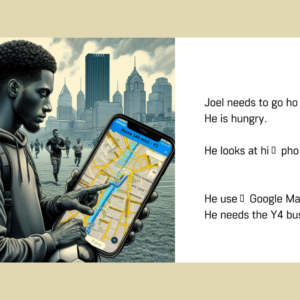
By Zoe Reinecke
When discussing digital equity, the future of work and education, we must consider what is happening with technology and in particular, artificial intelligence (AI). Acknowledging this need, Rachel Riggs moderated a panel in March of 2023 at the Coalition on Adult Basic Education (COABE) conference in Atlanta, GA. The COABE panel brought together three diverse perspectives represented by each panelist, and the response following the panel indicated a high level of interest and curiosity on the topic. Here’s what we heard during COABE and how we’re responding to these areas of interest in the upcoming EdTech Bytes webinar series on generative artificial intelligence. (Register here!)
What we heard…
From an emergent technologist in Silicon Valley
Christopher Lafayette, founder of Gatherverse and The Black Technology Mentorship Program, shared with the audience how monumental the recent advancements have been and how they have impacted jobs and morale in Silicon Valley. When ChatGPT set the record as the fastest-growing consumer application in history, it initiated what some news sources have referred to as the “AI arms race.” Christopher inspired us all to learn how to work with AI and use it confidently, stating that AI might not replace us, but someone who knows how to leverage it will.
During the first webinar, “Zero to Hero,” of the EdTech Bytes series, World Education staff will explain some of the language and recent events that Christopher referred to during the panel and give an overview of notable reactions within education.
From an edtech developer and language learning expert
Panelist Dr. Katie Brown, founder of EnGen, a language upskilling application, shared her thoughts as an edtech developer and language learning expert. She urged educators to rethink their approach to assignments and what they consider to be a demonstration of knowledge and skill-building and to integrate technology into everything we teach adults, preparing them for the future of work and a technology-rich society. Dr. Brown also posed a question about giving attribution when using a chatbot for writing (or generative artificial intelligence in any creative work).
During the second webinar, “Power of Open,” of the EdTech Bytes series, Jeff Goumas will explore the implications ChatGPT’s open AI model and generative AI have on creativity, content licensing, and fair use. As leader of the CrowdED Learning initiative, Jeff will share considerations for how this might impact the generation of open education resources.
From an expert on edtech implementation in adult ed…
Joey Lehrman, project manager of ISTE’s SkillRise and co-founder of Community Learning Partners, provided insight into how educators can use ChatGPT to alleviate some of the stress of their jobs and critically engage their students. Joey surveyed education colleagues in Kentucky and Louisiana and found that 80% of those surveyed had heard of ChatGPT, 90% thought it would be useful for learners, 80% thought it might be helpful in their jobs, but only 30% had used ChatGPT. Teachers perceive ChatGPT as helpful but it is apparent that there are significant barriers to adoption. During the panel, Joey shared some ideas of how teachers have used ChatGPT to write a passage in multiple tones to be analyzed by students, draft creative writing prompts, have students and ChatGPT summarize a passage and then compare and contrast the summaries, and create exit quizzes.
In “Making it Work,” the third webinar of the series, we will hear from guests in the field who are using ChatGPT for job training, assessment, classroom activities, and as a teaching tool.
From administrators, teachers, and others in the audience
Educators are already leveraging generative artificial intelligence tools to accelerate productivity and creativity. Following the panel, many people approached our team to share how they have used ChatGPT specifically in their work and personal lives. Here are some examples of what people are writing with ChatGPT:
- A speech
- Text messages to students that have not attended class lately
- Letters to politicians
- Writing prompts
- Rubrics
- Resignation letters
- Recipe ideas that exclude allergenic foods
As you can see, teachers are already finding how this plugs into not just their role as an educator, but as a citizen, employee, parent, and more! As people adopt ChatGPT and similar tools, conversations surface about digital equity, language access, misinformation, and other ethical considerations. In the fourth webinar, “Humans in Focus,” we’ll discuss how to responsibly leverage AI in an educational and equitable way.
The EdTech Center at World Education is excited to continue learning alongside you as we collectively navigate the ever-evolving world of generative AI.



